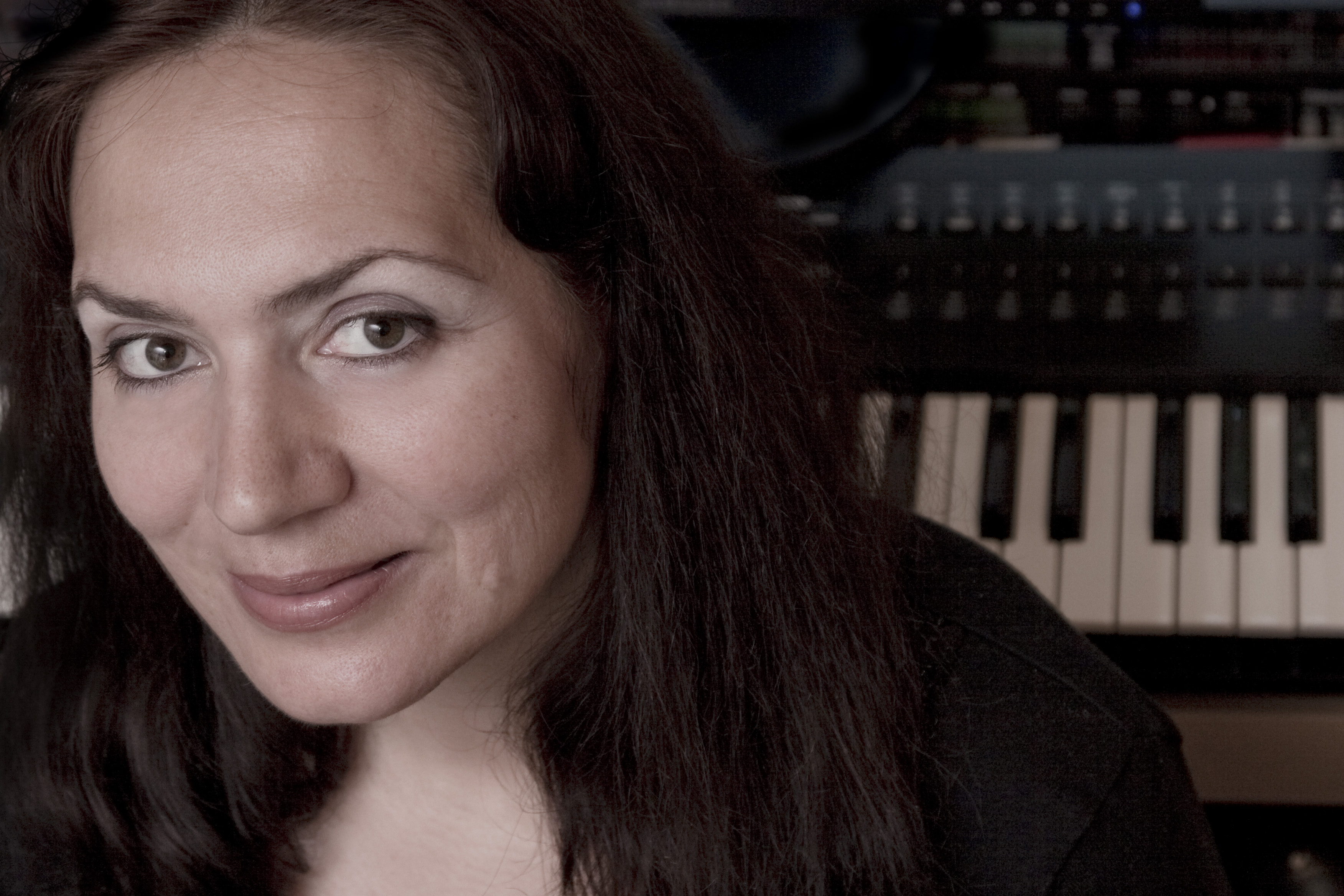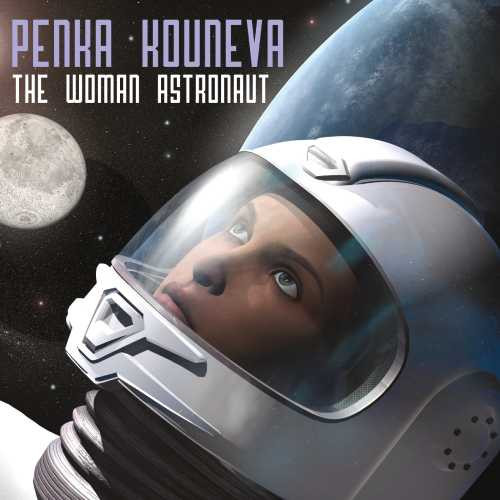Game Changer: Game Orchestrator & Composer Penka Kouneva Talks The Woman Astronaut and the Importance of Collaborators

Welcome to our series, Game Changer! Because it’s important to signal boost the work of women in the games industry (especially lately), we’ll be interviewing the awesome, brave, and talented women who bring their voices to indie and mainstream game development.
This week we sat down with Penka Kouneva, who works in both the film and games industry as an award winning composer on games like Prince of Persia and orchestrator on titles such as Bloodborne, Gears of War 2, 3 and Dragon Age II. She is also the composer of her own independent concept albums, the newest of which is an orchestral album called The Woman Astronaut.
Emma Fissenden (TMS): Can you tell me a bit about your journey?
Penka Kouneva: I was born in Sofia, Bulgaria and began piano lessons at the age of 6, then went to a High School of Music. Upon graduating Sofia Music Academy in 1990 I was awarded a Duke University Graduate fellowship and arrived in the US with $130 in my pocket. At Duke I was encouraged to explore my own voice as an artist. My music is tonal and dramatic, I’ve composed incidental music for theater since I was 12, I adore film, video games; when time came to choose a vocation for a lifetime, I chose to become a film/game composer and moved to Los Angeles in 1999. In 2004 I was introduced to Steve Jablonsky (by Bruce Fowler, the orchestrator for Hans Zimmer) and became his orchestrator.
In 2009 Jablonsky assigned me to compose high-level action loops on Transformers: Revenge of the Fallen game. I absolutely loved this composing and felt like my skills were a perfect fit. This job ignited my passion for video game scoring, and then I took a few years of non-stop playing, learning, research and deeply immersing myself into the game culture. My breakout game scoring job was Prince of Persia: The Forgotten Sands (2010, PS3, Xbox, PC, with themes by Jablonsky). It made me happier than I’ve ever felt as a composer. I was playing Bioshock 2 and Uncharted 2 at the time, and decided to truly immerse myself as a game composer, because game composing and these big narrative games made me the most energized and inspired I’ve ever felt in my professional life.
TMS: Can you describe what your role as an Orchestrator on a project involves? What’s an average kind of day for you on a major project at a company?
Kouneva: The orchestrator works closely with the composer on creating scores that are recorded with large or small orchestras. Usually the composer is under tremendous pressure to write an enormous amount of music in a short time, and to have “playback” meetings with the director, producers and studio heads to get approvals. While the composer is preoccupied with studio politics, tight budgets, composing, feedback and revisions, the orchestrator writes out the arrangements and ensures that the composer’s ideas sound at their very best. The orchestrator also liaises with orchestra contractors, recording engineers, music editors, musicians, and various score production personnel in planning the sessions. The daily work is crafting scores on the computer and lots of emails to the team.
TMS: How does that differ to work outside the games industry, say for example on your latest project, The Woman Astronaut?
Kouneva: When I work with game makers, my composing must support their vision and reflect their creative ideas. My duty is to compose the perfect score that will create the sonic environment and unique emotional experience for that one singular game. The Woman Astronaut, on another hand, is my own creative work, a concept album with modern orchestral-electronica music. It was my artistic vision and I was the boss – composed the music, programmed it, worked with my amazing collaborators – music producer Christopher Lord, sought feedback and conceptual guidance from my mentor Victor Rodriguez, then planned the recording session, orchestrated the music, produced the recordings, and ran the whole creative and production process which took 2 years.
[EDITOR’s note: you can listen to previews of The Woman Astronaut here at The Woman Astronaut Soundcloud.]
TMS: You’ve worked on both films and video games as a composer and orchestrator; how does your approach to each medium differ?
Kouneva: Technically, scoring games and film are very different. Conceptually, dramatically and emotionally great music could elevate any media. The ability to write distinctive themes that capture a character’s essence, to underscore grand concepts, sweeping landscapes or spine-tingling suspense are skills that translate from film to games. My commitment to games is fueled by a sense of exponential growth and creative freedom I felt while scoring games.
TMS: For those out there who are building their musical toolboxes, as it were, can you describe your workflow and the kinds of tools you use? Does it change depending on the project?
Kouneva: As a composer, my first task is to understand and feel the vision of my collaborators. We talk a lot about their project. My job is to create that special sound, unique sonic environment that will capture everything about their film or game and will set it apart. Then I compose the themes and get them approved. Then, there is a long process of creating every cue or game loop, composing, programming the virtual instruments, getting more feedback, doing more revisions. The toolbox is unique for every project as it has to reflect its ideas and specific emotions. But then, each composer develops a personal style, a sonic imprint and composers get hired on a job if the creators believe the composer’s style is a great match for what they want. As far as gear: I use 2 computers, 3 monitors, Digital Performer, Vienna Pro and professional libraries of samples. I also use pencil and music paper for sketching the themes.
TMS: Do you have any advice for those, especially women, who might be considering pursuing a similar career?
Kouneva: My first advice is, be as strong and distinctive artist as you can be. Develop your own musical persona, your “sound”, your creative “attitude.” Develop your skills, passion, interests. Once you have a very strong portfolio of music, then cultivate relationships in a deep and meaningful way, attend events like GDC, learn more, meet people, introduce yourself. Years will pass before a meeting with a potential collaborator materializes into a scoring opportunity. Composers must have enormous drive, tenacity, patience and long-view vision. But your musicality and artistry are the foundation of success. Then: collaborative skills, business acumen, entrepreneurial skills, technical fluency.
TMS: What’s one thing you wished the younger you would have known?
Kouneva: To be more consistent in my career development. To seek out more collaborators, not to wait for someone to call me. I had zero business acumen starting out; it took me years to learn how the entertainment business worked.
TMS: Can you talk about anything really difficult you’ve had to overcome both as a Composer/Orchestrator and as a woman in either the film or games industries?
Kouneva: As a composer my greatest and most inspiring challenge was to learn how to write interactive music. Games demand a real technical rigor and deep understanding of how the music will be implemented into the gameplay, how we wish to shape the gamer’s experience. Being a woman in the entertainment industry that historically has been so hard for women to crack is a daily challenge. I seek to grow as an artist continually, and I’m very proactive in building communities, attending events like GDC or Game Sound Con, mentoring, giving back, being a resource and inspiration to the others.
TMS: Okay, time for a couple of quick fire questions! What are three of your favourite games of the past year?
Kouneva: Wolfenstein, Diablo III, Infamous: The Second Son.
TMS: Of all time?
Kouneva: Bioshock, Uncharted, Gears of War 3, Final Fantasy.
TMS: What’s the most frustrating sequence you’ve played in a game?
Kouneva: Oh, the entire Modern Warfare 2 – getting killed over and over on a level.
TMS: Favourite character?
Kouneva: Dom from Gears of War 3 because he
TMS: Favourite piece of music from a game?
Kouneva: Journey made me weep, at the snow-covered mountain.
TMS: Favourite character of yours from a game you’ve worked on and why?
Kouneva: Gears of War 3 – I loved the Cogs, their backstory was engaging and they were emotionally riveting characters.
TMS: Favourite piece of your own music and why?
Kouneva: “The Forest” from The Woman Astronaut – mysterious, pastoral, sensual, part dark, part idyllic and inspired by my Bulgarian roots …
TMS: First game you ever played?
Kouneva: Space Invaders, Surgeon on Mac (this is around 1991).
TMS: Coffee or Tea?
Kouneva: Plain water.
Emma Fissenden is a writer of all trades. When she’s not pushing through her next rewrite, she’s playing too many games and editing fiction as the Editor in Chief at @noblegasqrtly. You can find her on Twitter @efissenden, or check out her other series for TMS, Game Changer.
—Please make note of The Mary Sue’s general comment policy.—
Do you follow The Mary Sue on Twitter, Facebook, Tumblr, Pinterest, & Google +?
Have a tip we should know? [email protected]
